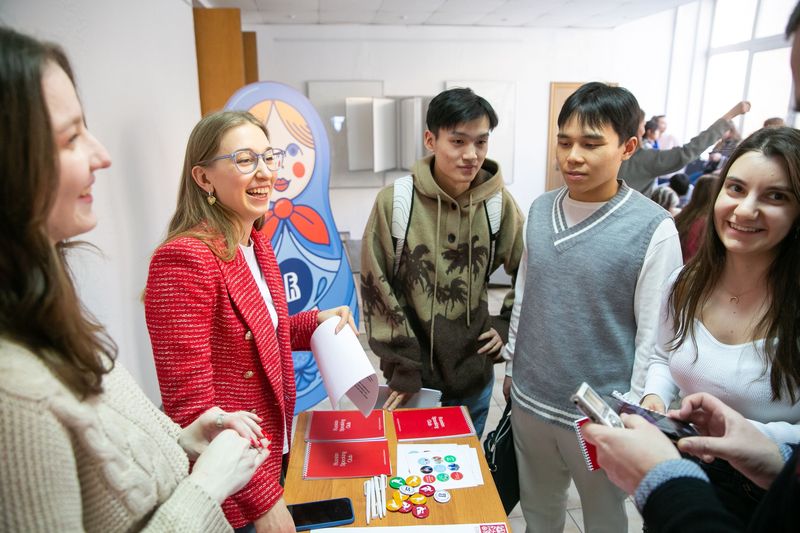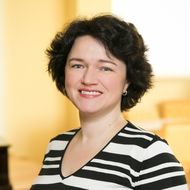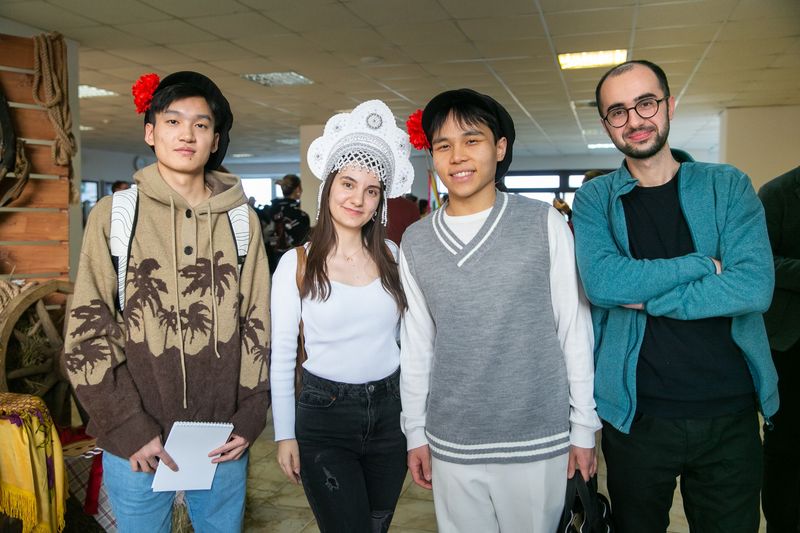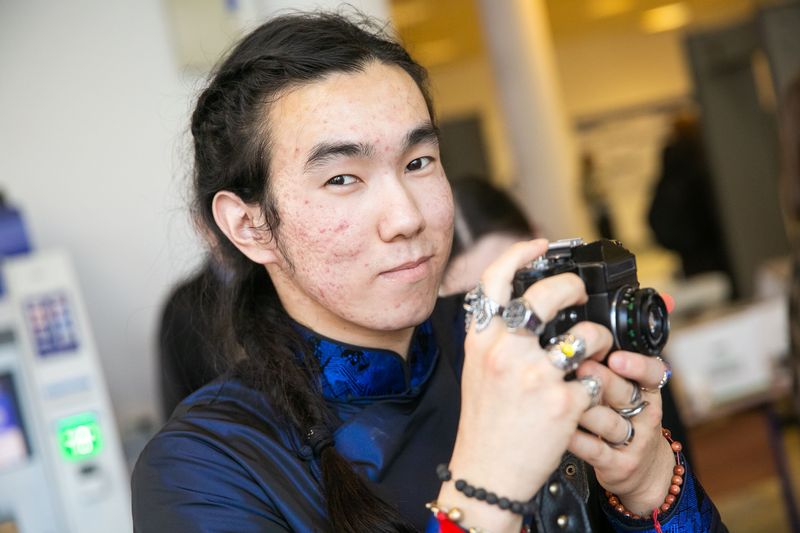Maslenitsa: HSE International Students Celebrate Russian Traditions

On February 22, the HSE University Faculty of Humanities held a Maslenitsa celebration at the building on Staraya Basmannaya. At the event, which was aimed at helping international students settle in, students learned about the meaning of Maslenitsa (or Pancake Week), enjoyed festive games and attractions, and feasted on pancakes with condensed milk. HSE students from various diasporas also showcased their own traditions for seeing off winter and offered a taste of their national dishes.
Maslenitsa is one of the most ancient Slavic holidays and is widely celebrated in Russia. This year, Maslenitsa week fell on February 20–26. The HSE event for international students was held at the start of ‘wide’ Maslenitsa, traditionally a time when people stop working and only have fun.

Yulia Grinkevich, HSE Director for Internationalisation
'Our event is designed to help foreign students learn more about the country they are studying in, its culture, and its traditions. This can be particularly helpful for those who arrived this academic year. During the entire week, Maslenitsa takes centre stage in mass media; it is celebrated in almost every home—people make pancakes and offer them to friends and even strangers. We would like our international colleagues to have a better idea of what it is all about. Celebrating Maslenitsa together on campus is perhaps the best way for them to learn about it.'
Philology students Vera Sayapina (who is also a research assistant at the Laboratory for Theoretical and Field Folklore Studies) and Angelina Bogachevskaya gave a talk on Maslenitsa's history and traditions in Russia. In particular, they explained that people used to eat a lot during Maslenitsa as it was the last chance for them to feast before the onset of Great Lent. Describing the traditional activities associated with Maslenitsa, the speakers referred to the old Cossack game ‘Taking a Snow Town’, depicted in Vassily Surikov's painting of the same name, and the burning of an effigy.
At the end of their talk, they held a quiz to test the audience's knowledge of Maslenitsa-related traditions, followed by a performance by 'Kudrinka', a Russian folk-dance group.
The activities took place in the assembly hall lobby and were arranged by volunteers of the HSE Support and Career Centre for International Students and Alumni. Highlights included photo zones, master classes, games, quizzes, and stalls serving pancakes with condensed milk.
Besides serving pancakes, the festival on Staraya Basmannaya featured a 'Catch a Pancake' contest, where participants tossed a fabric pancake and attempted to catch it with an inflatable frying pan, as well as a 'Bogatyr' strength test, which measured contestants’ strength on an 11-point scale (from 'weakling' to 'hulk') by having them hit an anvil with a hammer.
HSE's International Student Network, a volunteer-based student organisation that helps international students with social and cultural integration, hosted a 'Carousel' game, while the Spoon Colouring Master Class was led by student volunteers who have mastered traditional Russian patterns and painting techniques on wooden spoons and taught them to their international peers. Participants were able to keep their painted spoons as a souvenir from Russia, making this master class one of the most popular at the festival.
The Russian Speaking Club, a student-led project at HSE University, welcomed foreign students and gave them a chance to complete language challenges ranging from easy (such as agreeing or disagreeing with the statement that pancakes are often served with caviar in Russia) to challenging (saying a Russian tongue twister or doing a squat dance as instructed). Prizes were awarded to the winners.
'Our speaking club welcomes anyone who studies Russian as a foreign language and would like to speak it fluently. We meet every week to discuss topics related to the Russian language and culture. Maslenitsa at HSE is a good networking opportunity where foreign students can learn more about our club and perhaps join it,' said Karina Polyakova, fourth-year student of the Philology programme.

Kemal Aydin came to Russia from Turkey this academic year to study for a Master's in History and to work in the archives. His particular area of focus is relations between Russia and the Ottoman Empire. Currently, he is learning Russian as part of HSE's International Prep Year. 'Maslenitsa is a Slavic holiday I used to know nothing about. I am really enjoying this event for the good atmosphere and delicious pancakes. I also met with some of my friends from the Faculty of Humanities here; they are Russian students who study Turkish,' he said.
In addition to immersing themselves in the traditions of Russian Maslenitsa, participants of the event were able to learn how international students at HSE University celebrate the end of winter in their home countries. The HSE Chamber of Nationalities and the Belarusian, Georgian, Mongolian and Bulgarian clubs organised various cultural activities during the festival.

‘This celebration of Maslenitsa at HSE coincides with the second day of the Mongolian New Year,’ explained Tergel Bolor-Erdene, fourth-year student of the Bachelor’s in Design. He studied the programme online for the first two years while living in his hometown of Erdenet, and thus was introduced to Russian culture before moving to Moscow once COVID-19 restrictions were lifted. During the Maslenitsa event, he treated visitors to Mongolian specialties and described some of his country's traditions, such as the beliefs underlying the Mongolian horoscope and a method of divination using sheep knuckle bones.
Students of the Bulgarian Club, in addition to offering a taste of their country's traditional food, taught visitors how to weave a martenitsa, an amulet made of wool or cotton yarn and tied around the wrist on the first day of March for health and good luck throughout the year.
HSE University frequently hosts events to celebrate the cultural diversity of its students. Last October, the university hosted HSE UNITY FEST to introduce students to a variety of cultures, and last November, 'The Whole World in HSE' festival was held as part of the university's 30th anniversary celebrations. In early February this year, the HSE Cultural Centre hosted the 'Asian Flavour: from Riyadh to Tokyo' festival.
Yulia Grinkevich

